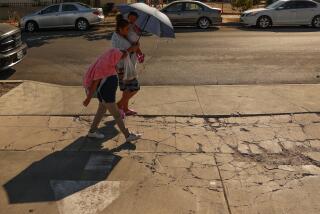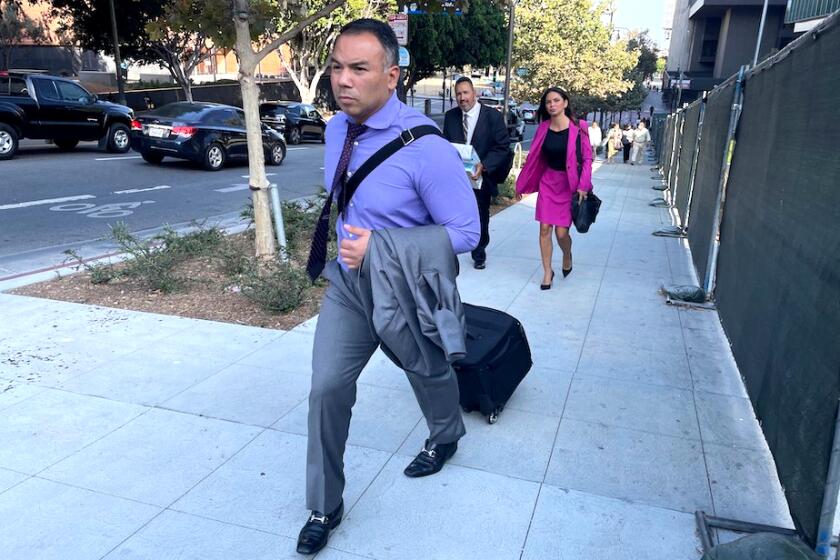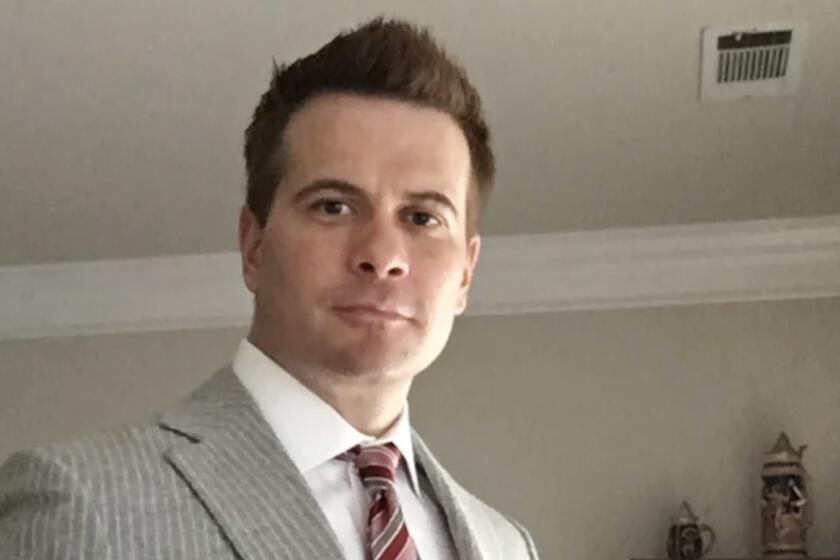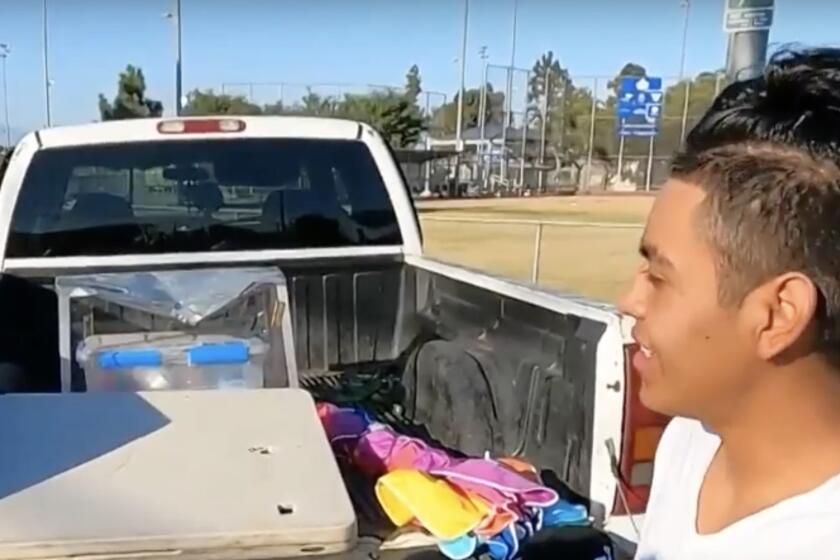Hahn Rethinking Owens Valley Plan
Two weeks ago Los Angeles Mayor James K. Hahn talked about creating a land conservancy to protect the Owens Valley from future development.
Now he’s not so sure and says he won’t make up his mind until he visits the valley and talks to residents.
“The Department of Water and Power has demonstrated over the last century that it has been the main reason that land has been kept in the pristine condition that it is,” Hahn said Friday.
The DWP’s role is key. Environmentalists insist that without a third party entrusted with the land, the city agency, which has managed the land for the better part of a century, would be free in the future to renege on preservation of the 320,000 acres of lush meadows, trout streams and Sierra foothills.
Now Hahn finds himself caught between the environmentalists and DWP board President Dominick Rubalcava, who has been one of the mayor’s top advisors and fundraisers. Rubalcava is adamantly opposed to a conservancy, wants the land to stay in DWP hands and has indicated he is not against limited development in the valley.
Hahn said Friday that he plans to travel to Inyo County with Rubalcava to hear firsthand from ranchers, elected officials and others who would be affected by any restrictions on development.
Hahn said he told environmentalists, including David Myers of the Wildlands Conservancy and former Councilman Mike Feuer, on Friday that he is open to their proposals, but will not finalize a plan until he has a chance to travel to the Owens Valley, which could happen Thursday if the state budget is resolved before then.
“I told them I am very interested in hearing their ideas, and ideas of other people, on how we can protect the land of the Owens Valley,” Hahn said, adding that creation of a conservation easement “is one of the concepts under discussion.”
The environmental activists gave the mayor a draft of a permanent conservation easement plan.
The city began acquiring the Owens Valley land in 1905 in order to obtain the water rights to meet the needs of the growing metropolis of Los Angeles. Much of the valley remains undeveloped -- a bucolic expanse of semi-wilderness ranch and farm lands, Native American reservations and small communities.
Environmentalists recently proposed that the city put the land under a state conservation easement by having the state purchase the DWP’s development rights for about $35 million. Under the proposal, the easement would be held in perpetuity by a third party representing regional stakeholders, and would be overseen by a conservancy board with power to make sure protections against development are enforced.
Backers of that idea were heartened last week when Hahn expressed enthusiasm for the possibility of the city establishing a land conservancy to protect the Owens Valley.
In a letter published in The Times on Monday, Hahn refined his views to say he was opposed to turning the land over to the state.
Since then, however, Hahn has begun voicing doubts about giving a third party control of conserving Owens Valley lands. Rubalcava is afraid that would put the future of the Owens Valley in the hands of others without the DWP’s interest at heart.
A Hahn appointee, Rubalcava has instead urged the mayor to support a plan that would have the DWP board simply adopt a resolution that would commit to protecting the Owens Valley from unreasonable development for 50 or 100 years, or longer. The DWP board, not a conservancy, would then make sure the commitment was kept.
“It maintains the flexibility within the leadership of the DWP and it would be consistent with the good stewardship we have maintained for 100 years,” Rubalcava said.
Rubalcava’s proposal has also sparked dissent in Hahn’s office. Deputy Mayor Doane Liu vehemently insisted that Hahn was not in favor of the idea hatched by the man Liu described as “the mayor’s trusted advisor.”
“That proposal can be undone by a future DWP commission, mayor or City Council -- or even the current commission,” he said. “That does not satisfy the mayor’s goal of preserving this land from development forever.” Yet, he also pointed out that Hahn is keeping an open mind.
Members of the Los Angeles City Council who have been promoting the idea of a conservancy said they will fight Rubalcava’s proposal.
Councilman Tony Cardenas vowed he would invoke council powers to take jurisdiction of the matter if the DWP board acts on Rubalcava’s proposal.
“They bring in something half-baked like that and I’m going to bring it into my committee,” Cardenas said. “It’s ridiculous.”
Hahn said he would not finalize his position until after his trip to the Owens Valley, but he has begun sounding more like Rubalcava.
“I am interested in actually going up,” Hahn said, “and talking to the folks in the Owens Valley -- conservationists and ranchers and outdoor enthusiasts -- and get from them their concerns about how we continue to protect Owens Valley like we have for the last 100 years.”
Hahn sent two deputies to the Owens Valley last week as an advance team to scout out public opinion and pave the way for his visit.
Hahn will be visiting an area where some people still harbor resentment for the secretive way Los Angeles bought up vast tracts of valley land, then sucked them dry by diverting Owens River water 200 miles south to the San Fernando Valley.
Bennett Kessler, owner and news director of KDAY television and radio in Bishop, said there is “concern over how things are unfolding outside of the public purview, and there is suspicion about motivation. For example, the mayor’s advance was up here a week ago, but they met privately with ranchers and special interest groups.”
Added Bishop Mayor Ted Gardner, “The big problem I have with all this talk of preserving Owens Valley is that it seems to have come up at the same time Mayor Hahn faces a difficult reelection campaign. I wish it wasn’t.”
Julie Bear, of the Eastern Sierra Land Trust and an Inyo County supervisor, angrily criticized Rubalcava for “prejudicing some people’s minds” before the mayor even leaves for the Owens Valley.
“It’s caused nothing but confusion and heightened suspicion and has challenged those of us trying to build a consensus around one plan.”
Underlying the call for permanence is a fear that the valley land could become more valuable than water in decades to come, rendering its fragile ecology vulnerable to subdivisions and trophy homes.
But Rubalcava said there is no such threat on the horizon and giving up stewardship of the lands to a third-party conservancy board could result in unreasonable restrictions on the use of the land. He worries a conservancy board dominated by environmental activists might try to stop ranchers from grazing their cows on the land when their leases expire.
He cited a current proposal by Bishop officials to expand the town’s airport on DWP land with “some responsible economic development” as a plan that might be blocked by a third-party conservancy board but which would be allowed under a DWP resolution.
“There is no threat right now to the Owens Valley,” Hahn said. “What we need to do is come up with a way that we can keep the Owens Valley the way it is now. At the same time, people need to understand very clearly that this city depends on the water rights that we have in the Owens Valley. We can’t exist without that.”
More to Read
Sign up for Essential California
The most important California stories and recommendations in your inbox every morning.
You may occasionally receive promotional content from the Los Angeles Times.












